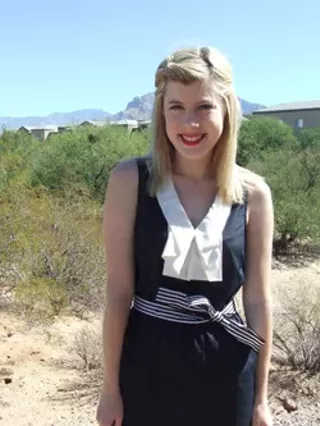Lana Hariri, 19, is a sophomore at the University of Arizona studying physiology/pre-med; she plans to eventually become a dermatologist. In July, Hariri was selected to take part in the 2011 Miss Arab USA Pageant. In September, she became the second runner-up in the annual contest, managed by the Arab American Association (AAA), a nonprofit based in Arizona. For more information, visit missarab.org, or search for Lana Hariri on Facebook.
Tell me a little about the Miss Arab pageant, and how you got nominated.
This pageant is relatively new—this is only the second year that they've done it. What I liked was that the AAA approaches positive women. This pageant doesn't have a swimsuit portion in the program, which has been shocking to some people, because in other (pageants), it's a huge deal. The AAA really values the inner beauty of an Arab girl. To get into the pageant, I had to answer questions about Middle Eastern history ... like, "Who is the king of Jordan?" and, "When was the country of Turkey formed?" There was even an Arabic-speaking "quiz." I thought I didn't make it! I was more worried about the history questions, though.
What did you need to do to prepare for the pageant itself?
What didn't I do to prepare for it? Of course, we had to get our outfits together and approved by the AAA. We were also given a list of questions and had to figure out what our platform would be on certain issues and topics. I also had to raise money for the AAA. I did this through asking for donations from my family and friends. The pageant itself was so much fun—and it was busy. I was with all these girls for four or five days. We got along really well, but we were pretty exhausted by the end of it!
What question were you asked during the pageant?
Only girls who make it to the Top 5 are asked questions. Onstage, they asked me, "What do you think this country can do to improve job opportunities?" I answered with this: If people become more educated, they will have more opportunities, and with their education, (they) would provide additional opportunities for others. If a person becomes a doctor and opens (his or her) own office, (he or she) would need to hire staff members who would equally need an education to be employed.
What made you want to compete in the pageant?
My culture has been put in a negative way for so many years since Sept. 11—mostly from the media, but from stereotypes, too. What people don't understand is that our culture is not related to violence at all. I remember when Sept. 11 first happened; I was young, but people would ask me, "Aren't you Arabic?" I remember one guy asked me, "Are you a terrorist?" ... My father was born in Syria, and we travel there every summer. When we go to Mexico, we're always held back for questioning because of our passport stamps.
What do you think the media can do to represent your culture better?
I would love to see the media portray an average life in the Middle East, or even an Arab living in America. On TV, you often see the dirt roads, the military and the deserts—and these kids who are very unfortunate and poverty-stricken. That is not at all what I see when I go to Syria and Lebanon. Lebanon especially—it's like the Las Vegas of the Middle East. These countries have a lot to offer. I would love to see the media cover those areas of the Middle East more often.
What are positive things that no one sees about your culture?
The Arab culture really values education, and they are really family-oriented and hospitable. My dad is a professor at the UA, and my mom is a dentist—they really value my education. And the fact that we go to Syria shows that we are family oriented—at Christmas, more than 100 of our closest family and friends get together to celebrate.
What was your family's reaction to you entering a beauty pageant?
I thought my parents wouldn't let me do it, but they looked at it like, "This is a one-time opportunity to be an Arab-American representative for women in this country, and be a role model for younger girls." They were so excited. I think slowly but surely, the pageant has created a positive effect in general. ... I'm the youngest who has been in the Top 5—that's an honor. My family is proud of that.




